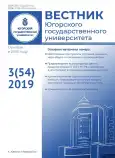Том 15, № 3 (2019)
- Год: 2019
- Выпуск опубликован: 01.10.2019
- Статей: 7
- URL: https://vestnikugrasu.org/byusu/issue/view/1115
Доктринальные основы противодействия преступности
Юридический анализ содержания категории «уголовно-правовое воздействие»
Аннотация
Категория «уголовно-правовое воздействие» в настоящее время активно исследуется в отечественной юридической науке на предмет соотношения с содержанием категорий «уголовное наказание», «иные меры уголовно-правового характера», «уголовная ответственность». В представленном исследовании поставлена проблема определения разновидностей уголовно-правового воздействия и особенностей их реализации в зависимости от наличия либо отсутствия отдельных юридически значимых признаков. Учитывая заявленную проблематику, предмет исследования определяется в виде уголовно-правовых норм, закрепляющих лишения и правоограничения, которые применяются к лицам, совершившим запрещённое уголовным законом общественно опасное деяние.Применение в процессе исследования совокупности общенаучных и частно-научных методов позволило сформулировать итоговый вывод, что уголовно-правовое воздействие реализуется в результате применения мер уголовной ответственности и иных мер уголовно-правового характера. Уголовная ответственность реализуется на общих и льготных условиях. Основанием для применения последних является факт позитивного постпреступного поведения, существенно снижающего общественную опасность личности виновного.
 7-13
7-13


Стратегические направления противодействия отдельным видам преступлений
Неосторожная преступность: состояние, динамика, меры общего и специального противодействия
Аннотация
Предмет исследования составляет неосторожная преступность с учетом реализуемой национальной уголовно-правовой политики. Цель состоит в исследовании научного понимания, содержания и видов неосторожной преступности. Внимание концентрируется на состоянии, динамике неосторожной преступности, мерах общего и специального противодействия указанному социально-правовому явлению. Методологическую основу мер противодействия образует совокупность общенаучных и частно-научных методов, позволивших исследовать процесс новеллизации уголовного законодательства и реализации его на правоприменительном уровне.
Основные результаты исследования отражают проблемы профилактики, предупреждения, общего и специального противодействия неосторожной преступности, влияющие на эффективность реализации механизма уголовно-правового регулирования общественных отношений, связанных с преступлениями, совершенными по легкомыслию или небрежности. Сформулированы выводы относительно видов неосторожной преступности, ее удельного веса, личности неосторожного преступника, включая научное обоснование общих и специальных мер противодействия.
В качестве определяющей проблемы отмечена научно-практическая обоснованность законотворческих процессов. Раскрыты проблемы реализации уголовного закона в контексте нарастающих темпов неосторожной преступности, актуализирующие практико-ориентационные меры противодействия исходя из состояния, структуры, динамики развития указанного социально-правового явления. Внимание концентрируется на усилении санкций уголовно-правовых норм, регламентирующих повышенную ответственность за отдельные виды неосторожных преступлений, по существу не отражающихся на снижении криминальной напряженности в сфере неосторожной преступности. Раскрываются проблемные вопросы повышения качества уголовного закона, иных нормативных правовых актов, обеспечивающих профилактику, предупреждение и противодействие неосторожным преступлениям. Акцент внимания сосредоточен на повышении качества деятельности государственных органов власти, органов самоуправления и институтов гражданского общества, повышении уровня контроля.
 17-25
17-25


Противодействие коррупции в Российской Федерации: современное состояние и перспективы
Аннотация
Предметом статьи является анализ трех основных аспектов противодействия коррупции: профилактики коррупционных проявлений, борьбы с коррупцией и минимизации последствий коррупционных правонарушений. Рассмотрены отдельные пробелы в законодательстве, влияющие на эффективность противодействия коррупции, механизмы взаимодействия власти, бизнеса и общества, имеющие в качестве цели профилактику коррупции. Рассмотрена роль институтов гражданского общества в вопросах противодействия коррупции, а также влияние средств массовой информации на восприятие образа коррупционера. Затронуты проблема криминализации ответственности юридических лиц за коррупционные правонарушения, проблема применения такой меры уголовно-правового характера, как конфискация имущества коррупционера. Кратко рассмотрены возможности перевода в правовое поле некоторых аспектов коррупции в форме организации лоббистской деятельности. Также авторы рассматривают аспекты минимизации социальных последствий коррупции.
 26-31
26-31


Профилактика подростковых суицидов, совершенных под влиянием сети интернет
Аннотация
Предметом исследования являются причины совершения противоправных деяний, предусмотренных ст. 110.1 УК РФ, в сети Интернет в отношении несовершеннолетних, а также существующая система предупреждения данных противоправных деяний. Целью исследования является выработка предложений по совершенствованию указанного механизма предупреждения противоправных деяний. В результате исследования сделан вывод, что предупреждение противоправных деяний, предусмотренных ст. 110.1 УК РФ, совершенных в сети Интернет в отношении несовершеннолетних, должно включать следующие составляющие: обнаружение и пресечение суицидального контента; выявление лиц, состоящих в группах социальной сети и принимающих участие в «играх», и осторожное выведение их из таких сообществ; профилактика суицидального поведения с лицами, совершившими суицидальную попытку, и с их ближайшим окружением. Кроме того, огромное значение имеет ранняя профилактика опасного поведения несовершеннолетних в сети Интернет и разъяснительная работа с их родителями.
 32-38
32-38


Криминологические особенности личности преступника
Правовое противодействие деструктивным идеологиям в Российской Федерации: криминологическая характеристика, особенности, тенденции
Аннотация
В статье анализируются проблемы противодействия деструктивным идеологиям, получившим распространение в российском обществе настоящего времени. Данные идеологии имеют криминальный характер, и предопределяют последующее развитие экстремистской и террористической деятельности в Российской Федерации. Принадлежность представителей молодежи к той или иной деструктивной идеологии находит непосредственное отражение в их повседневном поведении. Автор рассматривает особенности наиболее общественно-опасных деструктивных идеологий. Одним из последствий распространения деструктивных течений является развитие ненависти и(или) вражды к другим лицам на основании расовой принадлежности, национальности, религии, вероисповедания и других признаков. Пропаганда деструктивных идеологий преследует цель вовлечения в различные по формату противоправные объединения новых лиц. Масштабное распространение деструктивных идеологий обусловлено процессами глобализации, которые имеют качественные характеристики. В заключении, высказываются предложения по совершенствованию правового механизма, направленного на противодействие деструктивным идеологиям.
 41-47
41-47


Криминологическая характеристика свойств личности, совершающей розничную продажу алкогольной продукции несовершеннолетним
Аннотация
Предметом исследования является криминологическая характеристика осужденных по ст. 151.1 УК РФ. Целью исследования является анализ нового типа личности преступника-правонарушителя, особенностью которого является привлечение к уголовной ответственности за совершение несколько аналогичных административных правонарушений. В результате исследования выявлены специфические социально-демографические характеристики осужденных по ст. 151.1 УК РФ, учет которых необходим для формирования системы профилактики такого противоправного поведения. Это невысокий уровень образования, возраст 30–49 лет, преступления совершаются, как правило, женщинами рабочих специальностей. Анализ социально-ролевой характеристики осужденных позволил выявить особенность данного преступления, которое имеет преимущественно «женское лицо». Это объясняется сферой деятельности, поскольку в торговле в основном заняты женщины. В результате исследования нравственно-психологической характеристики личности осужденных сделан вывод, что сфера торговли является в достаточной степени криминальной, и это в значительной степени обуславливает формирование криминальной мотивации осужденных.
 48-53
48-53


Региональные особенности обеспечения криминологической безопасности
Криминологическая безопасность региона
Аннотация
Предметом исследования является криминологическая безопасность региона как часть его общественной безопасности. Цель исследования – определение понятия «криминологическая безопасность региона», а также выявление приоритетных направлений обеспечения криминологической безопасности. В результате исследования сделан вывод о том, что деятельность по обеспечению криминологической безопасности региона предполагает, во-первых, выявление угроз состоянию защищенности важнейших социальных ценностей региона, во-вторых, оценку масштаба и существенности этих угроз, прогноз их динамики и действия на социальные процессы в регионе, в-третьих, составление плана противодействия этим угрозам, в-четвертых, конкретную деятельность государственных и иных субъектов по реализации этого плана.
 57-61
57-61











